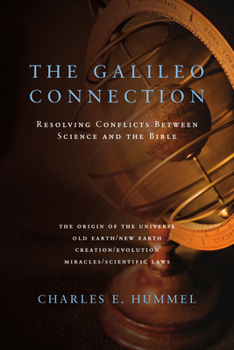The Galileo Connection
Select Format
Select Condition 
Book Overview
Telling the fascinating stories of Copernicus, Kepler, Galileo, Newton and Pascal, Charles E. Hummel provides a historical perspective on the relationship between science and Christianity.
Format:Paperback
Language:English
ISBN:087784500X
ISBN13:9780877845003
Release Date:February 1986
Publisher:IVP
Length:293 Pages
Weight:0.88 lbs.
Dimensions:0.9" x 5.6" x 8.3"
Customer Reviews
2 ratings
They Tricked The Pope
Published by Thriftbooks.com User , 16 years ago
Copernicus, Kepler, Galileo, and Newton were all Christians and could even be considered devout Christians. Newton was a bit of an outlier because he didn't believe in the Trinity, but spent as much time on theology as he did on science. This author is interested in the science and the religion of each man, how each dealt with conflicts between his science and his religion, and to what extent, if any, the church interfered with his scientific work. Galileo is of particular interest because he is the only one who was officially punished. His case is held up as primary evidence of severe discrimination by the 16th and 17th century religious hierarchy against science. Hummel's position is this: 1. Official science, as controlled by the university establishment scientists, was heavily reliant on the archaic science left over from Aristotle, illustrated best by their belief in Ptolomy's astronomy left over from the 2nd century. 2. Galileo had baited and antagonized university scientists with his sarcastic writings and public statements for over 20 years. 3. In his "Dialogues," Galileo formulated informal debates between Simplicius, a supporter of the old astronomy, a believer in the Copernican astronomy, and a neutral observer. The offended scientists suggested to Pope Urban VIII that Galileo was putting the Pope's words into the mouth of the fool, Simplicius. 4. The Pope, already distracted by several other complex political scenarios of the day, made the fateful error of allowing Galileo's trial and conviction. Galileo spent the rest of his life under house arrest. For over four centuries his story has been used by those who would cast the Church in the worst possible light. In the rest of the book, Hummel discusses the theory and history of evolution, the historical conflicts between that and creationism, and various theological topics. In particular, he compares scientists who make pronouncements about God with Christians who feel they must reconcile findings of science with the Bible. His view is summed up in these words: "Today many biblical Christians - like many non-theistic scientists - accept the theory of evolution, but others do not. The issues seem to remain in clearer focus when scientific and theological terms are not mixed. It should suffice to say, `I accept the biblical accounts of creation and the scientific theory of evolution.'" Extremists on both sides of the so-called creation-evolution controversy (today's updated version would be the ID/evolution war) might argue that it is impossible. Sometimes that seems to be the only point on which they can agree.
Stuck between your sunday school teacher modern science?
Published by Thriftbooks.com User , 26 years ago
Hummel offers a fresh look at the Creation Epic of Genesis 1. While steering a path between the literal and mythological approaches to Genesis, Hummel offers an approach that is both reasonable and faithful to a valid scriptural approach to the emergence of life on earth. If you are a student of "Creation" or sceptical of the typical presentation of biblical origens, you must read this book...






